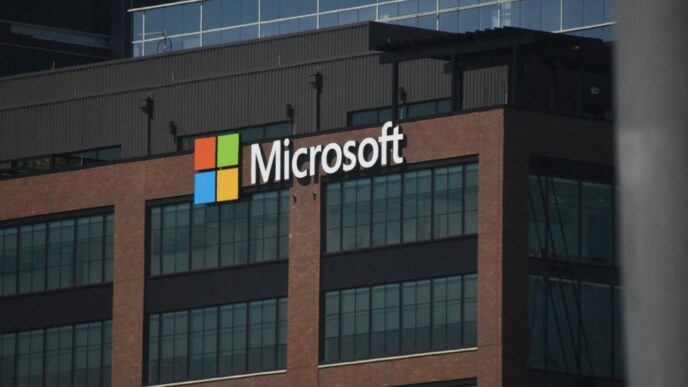Silicon Valley is a place where technology and creativity come together, shaping the future of our world. This vibrant area in Northern California has a rich history filled with innovation, from its early days as a farming region to becoming the tech hub we know today. Through captivating images, we will explore the iconic companies, stunning landscapes, and the entrepreneurial spirit that defines this remarkable place.
Key Takeaways
- Silicon Valley started as a farming area known for its orchards before transforming into a tech powerhouse.
- Iconic companies like Apple and Google began in humble settings, showcasing the spirit of innovation.
- The region is home to many famous tech campuses, including the unique Apple Spaceship Campus.
- Silicon Valley is surrounded by beautiful nature, blending innovation with stunning landscapes.
- The area’s history is marked by significant events and milestones that shaped the tech industry.
The Birth of Silicon Valley
Early Telegraph and Radio Services
Silicon Valley’s journey began in the 1800s when it was known for its telegraph and radio services. This area, originally called the "Valley of Heart’s Delight," was famous for its orchards, especially prunes. By 1909, San Jose had opened one of the first radio stations in the United States, marking the start of its technological evolution.
The Founding of Moffett Field
In 1933, Moffett Field was established, becoming a key site for the early aerospace industry. This development attracted scientists and researchers, laying the groundwork for future innovations. Moffett Field played a crucial role in the growth of technology in the region, especially during and after World War II.
The Role of Stanford University
Stanford University has been a significant player in Silicon Valley’s growth. From the early days, it acted as a tech incubator, with professors developing groundbreaking technologies. Notably, in the 1940s, early versions of the Doppler radar system were created here, showcasing the university’s commitment to innovation.
The transformation of Silicon Valley from orchards to a tech hub is a remarkable story of innovation and resilience.
| Year | Event | Significance |
|---|---|---|
| 1909 | First radio station opens | Marks the start of tech in the area |
| 1933 | Moffett Field founded | Key site for aerospace research |
| 1940s | Stanford develops radar | Early tech innovations begin |
In summary, the birth of Silicon Valley is a tale of transformation from agricultural roots to a thriving tech landscape, driven by early innovations and the influence of local institutions like Stanford University.
Iconic Tech Giants
Apple’s Journey from Garage to Giant
Apple started in a small garage, where Steve Jobs and Steve Wozniak created the Apple I computer. This humble beginning transformed into a global powerhouse, making Apple one of the most valuable companies in the world. Today, Apple is known for its innovative products like the iPhone and MacBook.
Google’s Rise to Prominence
Google began as a search engine project by Larry Page and Sergey Brin while they were students at Stanford. It quickly grew into a tech giant, dominating the search engine market. Google’s headquarters, the Googleplex, is a symbol of its success and innovation.
The Legacy of Hewlett-Packard
Hewlett-Packard, or HP, was founded in a garage in 1939, making it one of the first tech companies in Silicon Valley. HP is known for its printers and computers, and it played a significant role in the development of Silicon Valley’s tech landscape.
| Company | Year Founded | Founders |
|---|---|---|
| Apple | 1976 | Steve Jobs, Steve Wozniak |
| 1998 | Larry Page, Sergey Brin | |
| Hewlett-Packard | 1939 | Bill Hewlett, Dave Packard |
The journey of these companies shows how innovation and creativity can lead to monumental success in the tech world.
These iconic tech giants have not only shaped the landscape of Silicon Valley but have also influenced technology globally. Their stories inspire countless entrepreneurs to pursue their dreams in the ever-evolving tech industry.
The Start-Up Scene
The Traitorous Eight and Fairchild Semiconductor
In the 1950s, a group of eight engineers, known as the Traitorous Eight, left Shockley Semiconductor to start their own company, Fairchild Semiconductor. This move was crucial in shaping the future of Silicon Valley. Fairchild became a breeding ground for innovation, leading to the creation of many successful tech companies.
The Boom of Venture Capital
The 1970s marked a significant rise in venture capital investments. With the success of companies like Intel and Apple, investors flocked to Silicon Valley, eager to fund new ideas. This influx of capital allowed many start-ups to flourish, creating a vibrant ecosystem of innovation. Here’s a quick look at some key venture capital firms:
| Firm Name | Year Founded | Notable Investments |
|---|---|---|
| Kleiner Perkins | 1972 | Google, Amazon |
| Sequoia Capital | 1972 | Apple, WhatsApp |
| Accel Partners | 1983 | Facebook, Slack |
Modern Start-Up Culture
Today, the start-up culture in Silicon Valley is characterised by:
- Collaboration: Many start-ups share resources and ideas.
- Innovation: Constantly pushing the boundaries of technology.
- Diversity: A mix of backgrounds and ideas fuels creativity.
The spirit of entrepreneurship thrives in Silicon Valley, where every garage can be a launchpad for the next big idea.
This unique environment has made Silicon Valley a global leader in technology and innovation, attracting talent and investment from around the world.
Landmarks and Campuses
The Googleplex
The Googleplex is the main campus of Google, located in Mountain View. It is known for its unique architecture and vibrant atmosphere. The campus features:
- Open spaces for collaboration
- Recreational facilities like gyms and swimming pools
- Cafes offering free meals to employees
Apple’s Spaceship Campus
Apple’s new campus, often referred to as the Spaceship, is a stunning circular building in Cupertino. This campus is designed to promote creativity and teamwork. Key features include:
- A massive green roof that blends with the landscape
- State-of-the-art technology throughout the building
- Spaces for employees to relax and recharge
Facebook’s Menlo Park Headquarters
Facebook’s headquarters in Menlo Park is another landmark in Silicon Valley. The campus is designed to foster innovation and community. Highlights include:
- An open floor plan to encourage collaboration
- A rooftop garden for employees to enjoy nature
- Art installations that reflect the company’s culture
Silicon Valley is not just about technology; it’s also about creating spaces that inspire and motivate people to innovate.
These campuses are more than just workplaces; they are symbols of the innovation and creativity that define Silicon Valley. Each landmark reflects the unique culture of the company it houses, making them essential parts of the region’s identity.
Natural Beauty Amidst Innovation
The Santa Clara Valley’s Orchards
The Santa Clara Valley, once known as the Valley of Heart’s Delight, was famous for its lush orchards. These orchards produced a variety of fruits, with prunes being the most notable. Today, remnants of this agricultural past can still be seen amidst the tech giants.
- Key Fruits:
- Prunes
- Apricots
- Cherries
Breathtaking Landscapes
Silicon Valley is not just about technology; it also boasts stunning natural scenery. The region is surrounded by hills and parks that offer a peaceful escape from the bustling tech scene. Some highlights include:
- The rolling hills of the Santa Cruz Mountains
- The serene beauty of the Baylands Nature Preserve
- The picturesque views from Mount Hamilton
Parks and Green Spaces
Amidst the innovation, Silicon Valley has preserved many parks and green spaces for relaxation and recreation. These areas provide a perfect balance to the fast-paced tech environment. Notable parks include:
- Alum Rock Park: A great spot for hiking and picnicking.
- Shoreline Park: Offers beautiful views of the bay and is perfect for birdwatching.
- Vasona Lake County Park: A lovely area for boating and enjoying nature.
The blend of nature and technology in Silicon Valley creates a unique environment where innovation thrives alongside natural beauty.
In conclusion, the natural beauty of Silicon Valley is a vital part of its identity, reminding us that innovation can coexist with the environment.
Historical Transformations

From Prune Orchards to Tech Hub
The Santa Clara Valley, once known as the Valley of Heart’s Delight, was famous for its orchards and agriculture. In the early 20th century, it produced a significant portion of the world’s prunes and other fruits. As technology began to flourish, this region transformed into a tech powerhouse.
- Key Changes:
- Shift from agriculture to technology
- Growth of tech companies and start-ups
- Development of infrastructure to support tech industries
The Dot-Com Bubble and Its Aftermath
The late 1990s saw a rapid rise in internet-based companies, leading to the dot-com bubble. Many companies flourished, but the bubble burst in 2000, causing significant economic shifts.
| Year | Event | Impact |
|---|---|---|
| 1995 | Internet boom begins | Surge in start-ups |
| 2000 | Dot-com bubble bursts | Economic downturn |
| 2001 | Recovery begins | Stabilisation of market |
Evolution of the Skyline
As Silicon Valley grew, so did its skyline. The once quiet suburbs transformed into a bustling metropolis filled with modern architecture.
- Notable Landmarks:
- The Googleplex
- Apple’s Spaceship Campus
- Facebook’s Menlo Park Headquarters
The transformation of Silicon Valley is a testament to the power of innovation and the entrepreneurial spirit that drives progress.
This evolution reflects not just a change in industry but also a shift in culture and lifestyle, making Silicon Valley a unique blend of nature and technology.
Pioneers of Innovation

William Shockley and the Transistor
William Shockley was a key figure in the creation of the transistor, a vital part of modern electronics. He co-invented it at Bell Labs, which changed the way we think about technology. After disagreements at Bell Labs, he started his own company, Shockley Semiconductor Labs, in Mountain View, California. This was the first company to make transistors from silicon instead of germanium.
The Founders of Oracle
In 1977, Larry Ellison, Bob Miner, and Ed Oates co-founded Oracle, a company that would become a leader in database technology. Their work helped businesses manage data more effectively, paving the way for the software industry we know today.
The Visionaries Behind Cisco
Leonard Bosack and Sandy Lerner, both former Stanford faculty, founded Cisco Systems in 1984. They created networking equipment that connected computers, which was essential for the growth of the internet. Their innovations helped shape the way we communicate today.
The impact of these pioneers is still felt today, as their inventions laid the groundwork for the technology we use every day.
Summary of Contributions
| Innovator | Contribution | Year Founded |
|---|---|---|
| William Shockley | Transistor | 1956 |
| Larry Ellison | Oracle | 1977 |
| Leonard Bosack & Sandy Lerner | Cisco Systems | 1984 |
These pioneers not only changed the tech landscape but also inspired future generations of innovators. Their legacies continue to influence the world of technology.
Cultural Impact

Silicon Valley in Popular Media
Silicon Valley has become a fascinating subject in various forms of media. From movies to TV shows, its influence is evident. Notable examples include:
- HBO’s series "Silicon Valley" which satirises the tech industry.
- Documentaries showcasing the rise of tech giants.
- Films that highlight the entrepreneurial spirit of the region.
The Entrepreneurial Spirit
The culture of innovation in Silicon Valley encourages a unique entrepreneurial spirit. This is characterised by:
- Risk-taking: Entrepreneurs are willing to take big risks for potential rewards.
- Collaboration: Many start-ups thrive on teamwork and shared ideas.
- Continuous learning: The fast-paced environment pushes individuals to keep learning and adapting.
Global Influence of Silicon Valley
Silicon Valley’s impact extends beyond its borders. It has:
- Inspired tech hubs around the world.
- Influenced global trends in technology and business.
- Shaped the way we communicate and interact through technology.
The spirit of innovation in Silicon Valley is not just about technology; it’s about creating a culture that embraces change and encourages new ideas.
In summary, Silicon Valley is not only a tech hub but also a cultural phenomenon that has reshaped how we view technology and entrepreneurship globally. Its influence is felt in media, business practises, and the very fabric of modern society.
Aerial Views and Iconic Images
Silicon Valley from Above
Silicon Valley is a stunning sight when viewed from the sky. The contrast between nature and technology is striking. Aerial photographs reveal the sprawling campuses of tech giants alongside the beautiful landscapes of the Santa Clara Valley. Here are some notable features:
- Tech Campuses: The Googleplex and Apple’s Spaceship Campus are architectural marvels.
- Natural Landscapes: The valley is surrounded by hills and parks, providing a beautiful backdrop.
- Urban Development: The transformation from orchards to tech hubs is evident in the layout of the area.
Iconic Photographs of Tech Campuses
Several iconic images capture the essence of Silicon Valley’s tech culture. These photographs often highlight:
- The Googleplex: A vibrant campus filled with innovative spaces.
- Apple’s Spaceship Campus: A futuristic design that reflects Apple’s vision.
- Facebook’s Headquarters: A blend of modern architecture and open spaces.
Historical Aerial Shots
Historical aerial shots show the evolution of Silicon Valley over the decades. The following table summarises key changes:
| Year | Key Development | Description |
|---|---|---|
| 1940 | Prune Orchards | The valley was known for its agriculture. |
| 1970 | Tech Expansion | Major companies began to establish themselves. |
| 2000 | Dot-Com Boom | Rapid growth of tech firms and startups. |
The aerial views of Silicon Valley not only showcase its beauty but also tell the story of its transformation from a quiet valley to a global tech hub. The blend of innovation and nature continues to inspire many around the world.
The Future of Silicon Valley

Emerging Technologies
Silicon Valley is always at the forefront of new technologies. Some of the most exciting areas to watch include:
- Artificial Intelligence: AI is changing how we interact with technology.
- Biotechnology: Innovations in health and medicine are rapidly advancing.
- Green Tech: Sustainable solutions are becoming a priority.
Sustainability Initiatives
As the world faces climate change, Silicon Valley is taking steps to be more sustainable. Key initiatives include:
- Renewable Energy: Many companies are investing in solar and wind power.
- Waste Reduction: Start-ups are focusing on reducing waste in tech production.
- Eco-Friendly Campuses: New buildings are designed with sustainability in mind.
Predictions for the Next Decade
Looking ahead, experts believe Silicon Valley will continue to evolve. Some predictions are:
- Increased Remote Work: The pandemic has changed how we work.
- Diverse Innovations: More focus on gadgets that improve daily life, like multifunctional devices.
- Global Collaboration: Tech companies will work more with international partners.
The future of Silicon Valley is bright, filled with endless possibilities and innovations that will shape our world.
Silicon Valley remains a hub of creativity and ambition, where the next big ideas are just waiting to be discovered.
Events and Milestones
Major Tech Conferences
Silicon Valley hosts numerous tech conferences that showcase innovation and networking opportunities. Some of the most notable include:
- TechCrunch Disrupt: A platform for start-ups to pitch their ideas.
- Google I/O: An annual developer conference where Google unveils new products.
- Apple WWDC: Apple’s Worldwide Developers Conference, focusing on software updates.
Significant Product Launches
The valley has seen many groundbreaking product launches that changed the tech landscape:
- Apple iPhone (2007): Revolutionised mobile communication.
- Google Search (1998): Transformed how we access information.
- Facebook (2004): Redefined social networking.
Key Historical Moments
Several events have marked the history of Silicon Valley:
- The Dot-Com Bubble (1995-2000): A period of rapid growth followed by a significant crash.
- The Founding of Google (1998): A pivotal moment in internet history.
- The Launch of the iPod (2001): Changed the music industry forever.
Silicon Valley is a place where innovation meets opportunity, shaping the future of technology.
In recent years, events like "a celebration of 50 years of the internet" have highlighted the valley’s rich history and ongoing influence in the tech world.
| Year | Event | Description |
|---|---|---|
| 2001 | Dot-Com Crash | A major downturn in tech stocks. |
| 2004 | Facebook Launch | Introduction of a new social media platform. |
| 2007 | iPhone Release | Launch of a revolutionary smartphone. |
Conclusion
As we wrap up our visual exploration of Silicon Valley, we are left with a strong feeling of the creativity, ambition, and endless opportunities that characterise this unique area. The pictures shared in this article show not just the beautiful scenery and famous tech buildings, but also the lively spirit of those who work here. Silicon Valley is more than just a location; it represents human creativity and the drive to achieve great things. It reminds us that with a mix of vision and hard work, we can change the world. This lively place has given birth to many technologies that have changed our lives, and the images we’ve seen highlight the lasting spirit of innovation. Silicon Valley continues to inspire dreamers and doers, where the future is imagined and created, and where the skyline is always changing, reflecting the endless possibilities of human potential.
Frequently Asked Questions
What is Silicon Valley known for?
Silicon Valley is famous for being a major centre for technology and innovation, home to many well-known tech companies.
How did Silicon Valley start?
Silicon Valley began as a region known for its fruit orchards, but it transformed into a tech hub after World War II.
What are some major companies in Silicon Valley?
Some big names include Apple, Google, Facebook, and Intel.
What is the significance of Stanford University?
Stanford University played a key role in the growth of Silicon Valley by supporting tech research and start-ups.
What is the start-up culture like in Silicon Valley?
Silicon Valley has a vibrant start-up scene where new ideas and businesses are encouraged and funded.
What natural features can be found in Silicon Valley?
Silicon Valley has beautiful parks, orchards, and stunning landscapes that coexist with its tech environment.
What events are important in Silicon Valley?
Major tech conferences and product launches are significant events that attract attention to the region.
What does the future hold for Silicon Valley?
The future may include new technologies, sustainability efforts, and ongoing innovation.













